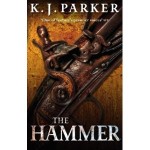The Hammer by KJ Parker, Reviewed
KJ Parker’s twelfth novel in thirteen years is detailed,  slow-building but ultimately utterly compelling.
slow-building but ultimately utterly compelling.
Gignomai (known as within the family as Gig) met’Oc, youngest son of the illustrious met’Oc family, is a loner in a family as skewed as anything created by Mervyn Peake. But Parker’s land is more like an early Australia, complete with savages who seem unable to see the settlers, and Gignomai seems at first read a much more ordinary youth.
The Hammer of the title refers to a device that Gignomai begins to build seven years after something happens at home – what it was is only made clear toward the end of the book, but it’s sufficient to cause the young man to run away repeatedly from home, and to bend his whole personality toward exerting a terrible justice.
In this vast, almost empty land, where a lone settlement and outlying farms are overshadowed by the plateau on which the met’Oc mansion rests, the met’Oc live by their own laws, refusing to accept that they no longer live in ‘civilization.’
The Hammer is a slow burning book that is laden down with the weight of detail of making things – of swords, carpentry and primitive heavy industry. It is also, with one exception, almost entirely devoid of the Fantastic, save for one important point that could be defined as SF or Fantasy. That the novel is classed as the latter is the rural -but certainly not bucolic setting- and the publisher’s classification.
KJ Parker is perhaps the most self-effacing writer since James Tiptree Jr. entered the field in the late 1960s – even Parker’s gender is unclear, although French publisher Bragelonne’s website implies that Parker the author is female. Without a single piece of short fiction published until 2009, Parker didn’t even have the traditional medium within speculative fiction for building a following – the novels have had to build a base on their own.
What is known about Parker is that she has previously worked in the law and as a journalist; nowadays she “makes things out of wood and metal,” and this fascination with craftsmanship runs right through her prose. The book is so full of the minutiae of manufacturing that initially it threatens to sink the story (though it does give it a refreshing solidity), a handicap that it gradually overcomes. In some ways The Hammer resembles a narrative avalanche; slow to start, almost unstoppable as it roars toward its climax.
